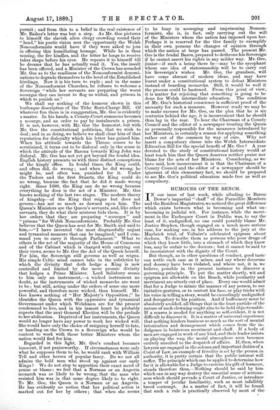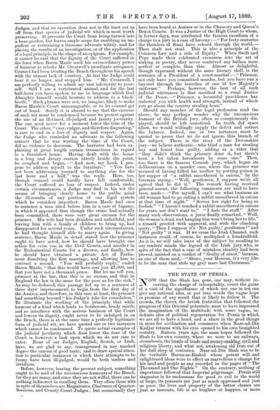HUMOURS OF THE BENCH.
IN our issue of last week, while alluding to Baron, Dowse's impartial " chaff " of the Parnellite Members, and the Resident Magistrates, we noticed the great difference which exists between what is becoming and what un- becoming in judicial wit. For instance, while the merri- ment in the Exchequer Court in Dublin was, to say the least of it, undignified, no one could possibly blame Mr. Justice Stephen, though engaged on a much more serious case, for making use, in his address to the jury at the Maybrick trial, of Voltaire's celebrated epigram about doctors. To describe them as persons who pour drugs of which they know little, into a stomach of which they know less, may be unfair to the doctors ; but it cannot be said to- be inconsistent with the dignity of the Court.
But though, as in other questions of conduct, good taste- can settle each ease as it arises, and say where decorum: and decency have been violated, and where not, it is, we believe, possible in the present instance to discover a governing principle. To put the matter shortly, wit and epigram are allowable on the Bench, while jocularity and merriment are utterly out of place. Every one would admit that for a Judge to mimic the manner of any person, to use imitative gestures, or to contort his face, or play tricks with: his voice in telling a story, would be exceedingly undignified and derogatory to his position. And if buffoonery must be- absolutely avoided, all things that in the least partake of the nature of such clowning ought also to be held objectionable. If a reason is needed for anything so self-evident, it is not difficult to discover it. It is a matter of universal experience that nothing hinders business so much as the sort of mental intoxication and derangement which comes from the in- dulgence in boisterous merriment and chaff. If a body of men are engaged in work of any kind, and their leader insists• on playing the wag, the moral atmosphere soon becomes entirely unsuited to the despatch of affairs. If, then, when lawyers are engaged in the solemn and important duties of a Court of Law, an example of frivolity is set by the person in. authority, it is pretty certain that the public interest will suffer. The principle which can be applied to determine how far it is allowable for a Judge to exercise his gift of humour, stands therefore thus,—Nothing should be said by him which can in any way destroy the essential sense of serious- ness which should pervade a Court of Justice, or introduce a temper of jocular familiarity, such as must infallibly breed contempt. As a matter of fact, it will be found. that such a rule is practically observed by most of the Judges, and that its operation does not in the least cut us off from that species of judicial wit which is most worth preserving. It prevents the Court from being turned into a bear-garden, but leaves ample scope for snubbing an im- pudent or restraining a tiresome advocate wittily, and for placing the results of an investigation, or of the application of a legal principle, in the shape of an epigram. For example, it cannot be said that the dignity of the Court suffered in the least when Baron Maule used his extraordinary power of humour to rebuke Mr. Cresswell's inordinate arrogance. Counsel had been treating the Bench throughout his speech with the utmost lack of courtesy. At last the Judge could bear it no longer, and stopped him. " Mr. Cresswell, I am perfectly willing to admit my vast inferiority to your- self. Still I am a vertebrated animal, and for the last half-hour you have spoken to me in language which God Almighty himself would hesitate to address to a black- beetle." Such phrases were not, we imagine, likely to make Baron Maule's Court unmanageable, or to let counsel get out of hand. Surely it is absurd to say that the exercise of such wit must be condemned because we protest against the use of an ill-timed, ill-judged, and jaunty jocularity. The one need never for a moment lower the tone of the Court. The other, " easy, vulgar, and therefore disgusting," is sure to end in a loss of dignity and respect. Again, the Judge who reminded an advocate in the following manner that he was wasting the time of the Court, did no violence to decorum. The barrister had been ex- plaining at great length certain transactions in regard to a furnished house. Having dealt with the house in a long and dreary oration utterly beside the point, he coughed and began,—" And now, my Lord, I pro- pose to address myself to the furniture." " You have not been addressing yourself to anything else for the last hour and a °half," was the reply. Here, too, though counsel could hardly have felt comfortable, the Court suffered no loss of respect. Indeed, under certain circumstances, a Judge may find in his wit the means of bringing clearly home to the public mind the ill-results of any portion of our legal system which he considers imperfect. Baron Maule had once to sentence a man tried before him in a case of bigamy, in which it appeared that though the crime had actually been committed, there were very great excuses for the prisoner. His wife had been drunken and unfaithful, and leaving him with a family of children to bring up, had disappeared for several years. Under such circumstances, he had thought himself able to marry again. In giving sentence, Baron Malik in detail stated how the prisoner ought to have acted, how he should have brought one action for crint. con. in the Civil Courts, and another in the Ecclesiastical Courts for a. divorce, and finally, how he should have obtained a private Act of Parlia- ment dissolving the first marriage, and allowing him to contract a second. "You will probably reply," ended Baron Maule, " that this would have cost you 1'1,000, and that you have not a thousand pence. But let me tell you, prisoner at the bar, that this is no excuse, and that in England the law is the same for the poor as for the rich."
. As may be deduced, this passage led up to a sentence of three days' imprisonment, to begin from the first day of the Assizes, and therefore, in this case at least, the prisoner had something beyond " his Judge's joke for consolation." To illustrate the working of the principle that while humour of a kind which leads to boisterous, heady mirth, and so interferes with the serious business of the Court and lowers its dignity, ought never to be indulged in on the Bench, there is at the same time a perfectly legitimate form of judicial wit, we have quoted one or two instances which cannot be condemned. To quote actual examples of the judicial jocularity which does lower the tone of the Court is, however, a task upon which we do not care to enter. None of our Judges, English, Scotch, or Irish, have, we are glad to say, transgressed in any marked degree the canons of good taste; and to draw special atten- tion to particular instances in which their attempts to be funny have been ill-judged, would be both useless and invidious.
Before, however, leaving the present subject, something ought to be said of the unconscious humours of the Bench, for they are many, and since they are not wilful, there can be nothing indiscreet in recalling them. Very often these wits m spite of themselves are Magistrates, Chairmen of Quarter- Sessions, and County-Court Judges ; but occasionally they have been heard at Assizes or in the Chancery and Queen's Bench Courts. It was a Justice of the High Court to whom, in former days, was attributed the famous exordium of a charge to a jury in a case of larceny :—" For forty centuries the thunders of Sinai have echoed through the world,— Thou shalt not steal. This is also a principle of the Common Law and a rule of Equity." When Swift and Pope made their celebrated excursion into the art of sinking in poetry, they never contrived any bathos more perfect or complete than this. Almost as delightful, though expressed without the same literary skill, is the sentence of a President of a court-martial :—" Prisoner, not only have you committed murder, but you have run a bayonet through the breeches of one of her Majesty's uniforms." Perhaps, however, the best of all such judicial utterances is that ascribed to a rural Justice of the Peace,—" Prisoner, a bountiful providence has endowed you with health and strength, instead of which you go about the country stealing hens." Should any member of the legal profession read the above, he may perhaps wonder why the unconscious humour of the British jury, often so conspicuously dis- played, should be left unnoticed. In truth, did space allow, we would willingly supply the defect and correct the balance. Indeed, one or two instances must be quoted to prove that we do not ignore this branch of the subject. There is the story of the Devonshire jury—we believe authentic—who tried a man for stealing hay and found him guilty, adding as a rider that " they didn't think the prisoner done it, but there's been a lot taken hereabouts by some one." Then, too, there is the famous Cornish jury, which began its deliberations on a murder case, where the prisoner was accused of having killed his mother by putting poison in her supper of " a rabbit smoothered in onions," by the foreman saying : " Well, gentlemen, I suppose we're all agreed that he did it." The remark having received general assent, the following comments are said to have been made :—" For myself, I can't see what business an old woman had to go eating a rabbit smoothered in onions at that time of night." " Serves her right for being so foolish." " I haven't touched a rabbit smoothered in onions for years, nor don't want to." " I hate the stuff." After many such observations, a juror finally remarked, " Well, the woman's dead, and hanging him won't bring her to life," a remark greeted with approval, and with the clinching query, " Then I suppose it's Not guilty,' gentlemen?" and " Not guilty " it was. If we cross the Irish Channel, such instances could, of course, be multiplied a hundredfold. As it is, we will take leave of the subject by recalling to our readers' minds the legend of the Irish jury who, in spite of the fact that a case of mistaken identity had been proved, insisted on a verdict of " Guilty of arson," because, as one of them said,—" Shure, your Honour, it's very like to be the man that stole my grey mare last Christmas."



































 Previous page
Previous page